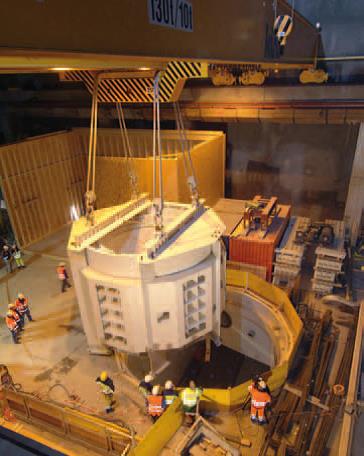By networking the experience records of many employees, GABEK identifies successful and less successful processes and represents relevant evaluations of partial products and routines. This results in the development of strategies appropriate to the situation as well as functional aims and measures for future improvements.

Photo: Illwerke
Example: Evaluation of the construction of the pump storage power station Kops II (Vorarlberger Illwerke AG)
Problem
By constructing the great pump storage power station Kops II and implementing many innovations, Vorarlberger Illwerke AG earned a leading position worldwide in know-how regarding pump storage power stations. They wanted to collect and systematize the experiences of the employees.
Aims
The company used a GABEK project to collect experiential knowledge of team members gained during the construction of the pump storage power station. The goal was to show common models, which can be proven through different partial experiences, rather than to represent personal statements. The project would go on to represent relations between the experience models and aid in project management by suggesting further big construction projects as well as best practices to cut expenses, avoid mistakes and qualitatively optimize company performance.
Method
The base data entailed 58 one-hour open interviews with the team members involved in the construction process, including representatives of the legal and finance departments, planners, construction and mounting supervisors, the managing board, four experts from other companies and one representative of the responsible authority .
The verbal data were networked according GABEK rules, using key concepts as nodes and connecting the texts. During two feedback workshops, a company team used network graphs to select core topics. Causal assumptions and evaluations expressed in the interviews were used to reflect the aims and measures of the company. In two implementation workshops, strategic and operating measures were selected to help realize the core topics.
The selected pairs of core topic with related measure were then ordered in 20 groups, with the aim of avoiding negative side effects and friction losses during their realization. Within each of these groups, the most persistent exchange of information was identified for the implementation process. In this way, not only the measures, but also the teams responsible for them, could be determined for future construction projects.
Benefits
GABEK nets were used as maps for the determination of core topics, goals and measures. In this way the experiences of different employees informed strategic goals and operating recommendations for future construction projects.
A special analysis of the interviews regarding ethical values made evident what the Company judges to be “intrinsic good.” This doesn’t refer to questions about what would be useful or beneficial but to questions that reveal what the employees see as good in an ideal sense, i.e., what furthers the sense of community within the Illwerke AG and fosters wellbeing and cooperation between all the individuals concerned.
More information:
 Deutsch
Deutsch  English
English 